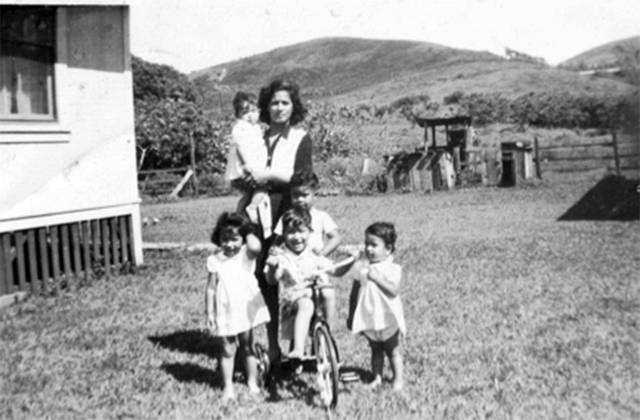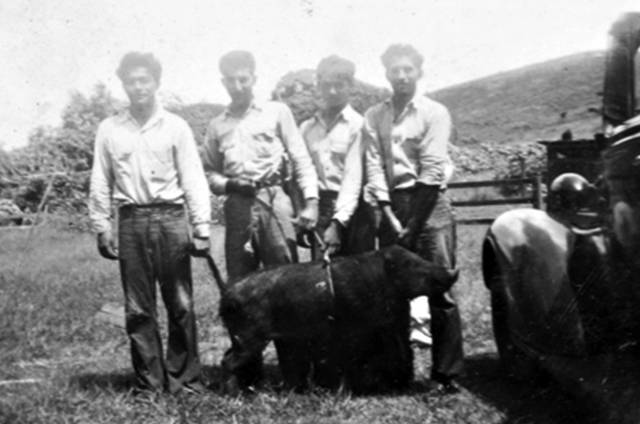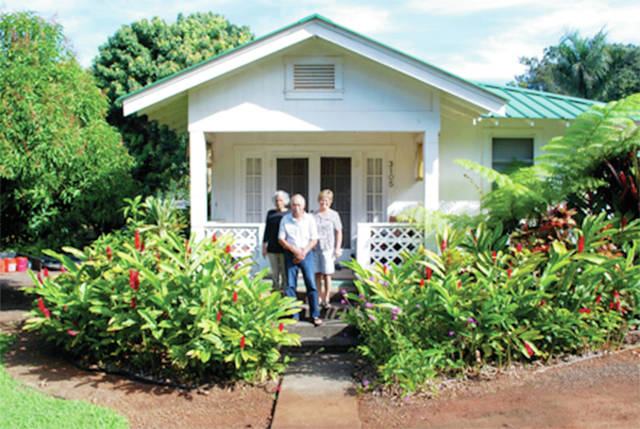A small death on Kauai

Photo courtesy Errol Pak
Rosalina Andrade and her four children, plus one cousin. In her arms: Cecilia Andrade. In front from left, Rosemary Andrade, Joseph Andrade Jr., Agnes Andrade, and behind the bicycle cousin Ansley Smith.

Photo courtesy Errol Pak
The cowboy cousins and a wild mountain boar. From left are Francis Chandler, an unidentified paniolo, Leo Chandler and Joseph Andrade.

Photo courtesy Errol Pak
Joseph Andrade posing for his eighth-grade graduation photo.

Photo courtesy Errol Pak
The surviving Andrade children in front of the original family home. From left are Rosemary, Joseph Jr. and Cecilia.
On a fine, warm Wednesday in September, Joseph Andrade had no sense that he would be killed by a bomb before the day was out. He was a civilian doing his job on home soil, but these were not ordinary times. The world was at war for the second time in the 20th century, and the Japanese attack on Pearl Harbor was a bloody reality for the residents of the Hawaiian Islands in 1944.
On a fine, warm Wednesday in September, Joseph Andrade had no sense that he would be killed by a bomb before the day was out. He was a civilian doing his job on home soil, but these were not ordinary times. The world was at war for the second time in the 20th century, and the Japanese attack on Pearl Harbor was a bloody reality for the residents of the Hawaiian Islands in 1944.
Joseph Andrade had a job that most Kauai boys would have loved. His work for the Board of Agriculture and Forestry (Territory of Hawaii) kept him outdoors in the mountains and hillsides of the island. He had grown up under the tutelage of his paniolo (Hawaiian cowboy) father working cattle and ranching in the Lawai Valley; his dad taught him how to hunt and navigate the island’s rough terrain.
His forestry job was a natural extension of his lifestyle and thus allowed him opportunities to occasionally shoot a pig or goat. The game he brought home went a long way to feeding his family, especially with the shortages of wartime. The Andrades had just completed building their home on family land and his wife Rosalina was pregnant with their fourth child, Cecilia. Joseph had accumulated a fair number of cattle with hopes of expanding the herd.
All the stars seemed to be lining up for the Andrades. But the universe changes directions in a flash, and sometimes all that is vanishes in an instant.
Joseph contemplated his next work assignment with a certain unease. He was tasked to lead a group of 12 soldiers up into the mountainside near the Kahukuula area of Mount Kahili in order to re-plant trees denuded by recent artillery practice. He told his wife Rosalina that he was wary of this assignment because he was the only civilian in an otherwise military operation.
Despite his misgivings he dutifully joined the work party the next day and ascended the difficult terrain to the work site. Evidence of the destructive nature of the military’s weaponry was manifested in the broken earth and foliage. The assembled group set to work planting trees through the morning heat and humidity.
Joseph was glad to sit for a lunch break near noon, his sweat-soaked clothes sticking to his skin. The others were lying about in groups smoking, laughing and chiding each other about women and other raucous pursuits.
The crew was slowly rising from their mid-day meal when someone, in the act of standing, detonated a shell. The blast itself rained chaos on the small crew of men sending flesh, blood and dirt in all directions.
A makeshift triage assembled by the unhurt or less injured sorted out the most seriously wounded and readied them for transport. Joseph and an unnamed soldier had both sustained life-threatening injuries that required immediate attention.
The soldier died in transport while Mr. Andrade survived long enough to give his account of the accident from his ad hoc hospital bed in the Kalaheo school. The school was ironically built on the property his family once owned where Joe had played as a boy.
While he lay dying in his hospital bed, Joseph recounted the accident to his wife Rosalina, Father Henry Boeymaens and an un-named nurse attending to him. He told his wife that he was sitting down for lunch and when he stood up something exploded.
The brief and pointed description of Mr. Andrade’s is the only eyewitness account accessible and on record. Joseph Andrade was pronounced dead early the next morning at 1:55 a.m. on Sept. 21, 1944. He was only 24 years of age and leaving the world behind to his heartbroken wife and family.
Bombs kill humans in a couple of ways: the blast wave propagates extremely quickly and is very lethal to unprotected persons in the blast radius. It often results in such physical trauma to the organs (typically all at once, but hollow organs are most susceptible due to the pressure differential) and death from shock or organ failure (or massive internal bleeding) is the likely result.
Shrapnel is the other culprit; a physical manifestation of an explosive device, depending on the type and size of the explosive. The explosion hurtles pieces of jagged steel which cut through the soft human form with violent and often deadly results.
The immediate cause of death to Mr. Andrade as listed on his death certificate: “Shock, severe, secondary to hemorrhage, traumatic due to amputation, traumatic, incomplete right thigh, multiple wounds extensive. Wound, penetrating right chest. Amputation right thigh, multiple wounds, extensive. Perforating mid liver, hemopneumothorax, severe.”
Joseph’s death was barely a footnote in the annals of Kauai Island history. The only press coverage of the tragedy appeared on page five of The Garden Island newspaper in a small 185-word article where some family members were misidentified.
The lack of media or any other type of attention was not surprising given the that Hawaii was under martial law with the Untied States military administrating civilian governance.
The control of the military over the Hawaiian Islands was to some extent a military dictatorship that lasted from the aftermath of the Japanese attack on Pearl Harbor until October 1944.
The story would have ended with the death of Mr. Andrade and the inevitable passage of time if not for the courage and fortitude of Mrs. Rosalina Andrade.
In an era where women had little voice or resources, this remarkable woman gathered up her four children with great strength and resolve.
She received meager compensation from Social Security, and nothing from the United States military. She would spend many years looking for answers and justice in the immovable world of government red tape.
In a letter to Congressman Daniel K. Inouye dated Dec. 28 1960, Mrs. Andrade summarized the events of her husband’s death in a clear and detailed three-page letter.
The congressman replied on Dec. 30, 1960, that he would do what he could if his investigation of the matter warranted it. No further communication concerning the matter is known to have come from the office of the congressman.
Mrs. Andrade’s eldest son, Joseph Jr., revived the issue in 2016 with Congresswoman Tulsi Gabbard.
While the congresswoman was responsive, the tragic death of Joseph Andrade continued to wash about in the bureaucratic river. Joseph Jr. received his last communication from Gabbard’s office by way of the Assistant Secretary of Defense (OASD) Ryan Joslin on Oct. 20, 2016.
The final words seemed devoid of hope: “the OASD states that a federal agency responsible for the concerns you wrote about are currently reviewing your case.”
Navigating the halls of justice is like climbing Everest in the sense that you may never reach the summit despite your best efforts. Given the passage of time and the circular shuffling that the Andrades have experienced, they would have every right to believe that their cause is insurmountable.
But there’s a bit of their mother in all the surviving decedents of Rosalina Andrade, and while they are good-natured, they are also a determined family.
Their quest for accountability from the U.S. military has carried them through 74 years and two generations, and I suspect they could carry on for another 74 years if needed.

